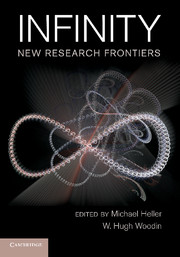Book contents
- Frontmatter
- Contents
- Contributors
- Preface
- Acknowledgments
- Introduction
- I Perspectives on Infinity from History
- II Perspectives on Infinity from Mathematics
- III Technical Perspectives on Infinity from Advanced Mathematics
- IV Perspectives on Infinity from Physics and Cosmology
- 7 Some Considerations on Infinity in Physics
- 8 Cosmological Intimations of Infinity
- 9 Infinity and the Nostalgia of the Stars
- 10 Infinities in Cosmology
- V Perspectives on Infinity from Philosophy and Theology
- Index
- References
7 - Some Considerations on Infinity in Physics
Published online by Cambridge University Press: 07 June 2011
- Frontmatter
- Contents
- Contributors
- Preface
- Acknowledgments
- Introduction
- I Perspectives on Infinity from History
- II Perspectives on Infinity from Mathematics
- III Technical Perspectives on Infinity from Advanced Mathematics
- IV Perspectives on Infinity from Physics and Cosmology
- 7 Some Considerations on Infinity in Physics
- 8 Cosmological Intimations of Infinity
- 9 Infinity and the Nostalgia of the Stars
- 10 Infinities in Cosmology
- V Perspectives on Infinity from Philosophy and Theology
- Index
- References
Summary
It is incumbent on the person who specializes in physics to discuss the infinite. And to inquire whether there is such a thing or not, and, if there is, what it is.
Aristotle, Physics III, 202b34I am a theoretical physicist, and, following Aristotle's injunction, I do consider my responsibility to discuss the problem of the notion of infinity in the world – in particular, to “inquire whether there is such a thing or not.” I will do so here by illustrating some aspects of the notion of infinity in the natural sciences.
I focus on the recent evolution of our understanding of this notion with regard to two classical problems where infinity has long been discussed: the infinite divisibility of space and the infinite extension of physical space, that is, infinite in the small and infinite in the large. The two disciplines that currently deal with these two problems within physics are quantum gravity and cosmology. I briefly summarize the current understanding of these two problems within these two disciplines.
This discussion leads me to some general considerations on the notion of infinity. I point out the risk of confusion that such a notion generates, if we mistake limitations of our mind and our intelligence with properties of the natural world, or hints of the supernatural.
I point out the danger that is inherent when we try to fill up the mystery of the world with groundless solutions. In my opinion, uncertainty is preferable to unfounded certitudes.
- Type
- Chapter
- Information
- InfinityNew Research Frontiers, pp. 167 - 175Publisher: Cambridge University PressPrint publication year: 2011
References
- 1
- Cited by



